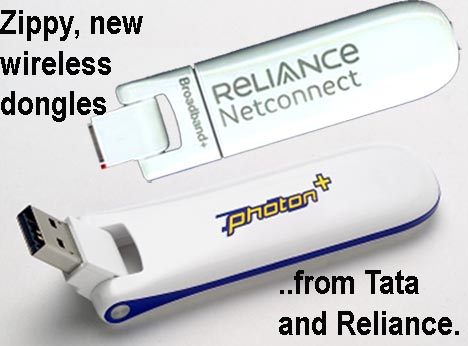
Reliance and Tata, launch USB wireless dongles for broadband Net access on the move
Finally, Indian portable computer users have the ability to surf the Internet while on the move, at something touching broadband speeds. Within weeks of each other, two leading mobile service providers have launched wireless Internet USB dongles for laptops ( they can also be used with desktop PCs of course) which promise download speeds that are at least 10 to 20 times faster than the best one could achieve till now, with wireless data cards from these same companies.
We were offered broadband dongles to try out by the early movers: Reliance Communications Net Connect Broadband Plus and Tata Indicom's Photon +. Tata also offers a wireless router for home/ office multi PC use; but we chose to concentrate on the laptop options from both players.
HARDWARE
The hardware is almost identical; while both Reliance and Tatas advertise the sleeker model which looks like a pen drive ( as illustrated above), both chose to send the slightly larger and identical device from ZTE, China, which has a provision to take a mobile phone SIM card and work off it if required. You don't need to do this if you subscribe to the wireless Internet plans of either company in India. Incidentally if you have multiple USB slots on your laptops, next to each other, opt for the sleeker non ZTE model; otherwise the device will block access to the adjacent USB port.
Reliance has embedded the access software in the device; the Tata photon comes with a CD which you have to install on your laptop. After that the experience is identical. The software will work in a plug-n-play way with almost all contemporary laptops running a Windows flavour
Tata is offering the service in selected cities like Bangalore, Hyderabad, Kolkata, Chennai, Mumbai, Jaipur, J&K and the North East. Reliance has a larger list of towns covering the south and west quite comprehensively, with a few places in North and Kolkata, but their footpirnt stops short of the NE and J&K.
Both promise speeds "up to 3.1 MBPS" but we have learnt from past experience that top speeds are almost never achievable in practice ( upload speeds in any case will be about half the top rating) and if you accept that typical speeds will be a tenth of the peak claimed, you will be in for less of a disappointment and will even be pleasantly surprised when the speed occasionally touched 1 MBPS. Such at any rate, was our experience with both models.
The whole matter of guaranteed speeds for Internet access is shrouded in technical uncertainties often beyond the providers' control and some techno-commercial fine print that effectively absolves them in the event you challenge them on why your average experience is so far below the promised peaks of performance. We have no solace to offer on this front except to say, that both these dongles provided a far superior experience compared to the wireless data cards that one has been using in India where the speed of access is often so slow that even a dial-up 56 KBPS will seem faster in comparison.
TARIFF
Tariff wise, the broadband services are costlier than the old data cards -- but not all that much. There are a variety of options starting with a monthly rental for Tata Photon of Rs 500 for half a GB of usage and Rs 2 extra per MB thereafter. Reliance's entry scheme is Rs 299 with nil bundling and Rs 2 per every MB of usage. Their Rs 499 per month scheme includes 10 GB bundled for night use and 50 paise per MB for day time. Both have plans going up to Rs 750 / Rs 850 p.m. Tata also offers a plan where you pay by time ( Rs 1 per minute) rather than by download size. Both dongles cost Rs 3500 each, on initial purchase.
Prospective buyers can check out the full details and the operational areas of both the wireless dongles at their respective websites:
http://www.rcom.co.in/Communications/rcom/RNetconnect/netconnect_broadband.html
http://www.tataindicom.com/HSIA-photon-usb.aspx
Unlike the wireless data cards offered by almost all the mobile operators, these broadband services are not ' all India' yet and your decision to upgrade or go in for a new connection will depend on where you expect to roam. Nationwide services are obviously what these will eventually become -- but let's face it, that is not going to happen tomorrow. Ofcourse these broadband dongles are ' downward compatible' that means, in places where the 3 MBPS network is not available you will still be able to connect to the slower, older networks.
That said, these zippy dongles are yet another step down the road to universal Net connectivity ... and for footloose Indians, an early taste of the high speed Internet that the world will eventually come to expect as the birthright of every human. So let's say Jai Ho to that.
- Anand Parthasarathy in Bangalore, May 18 2009